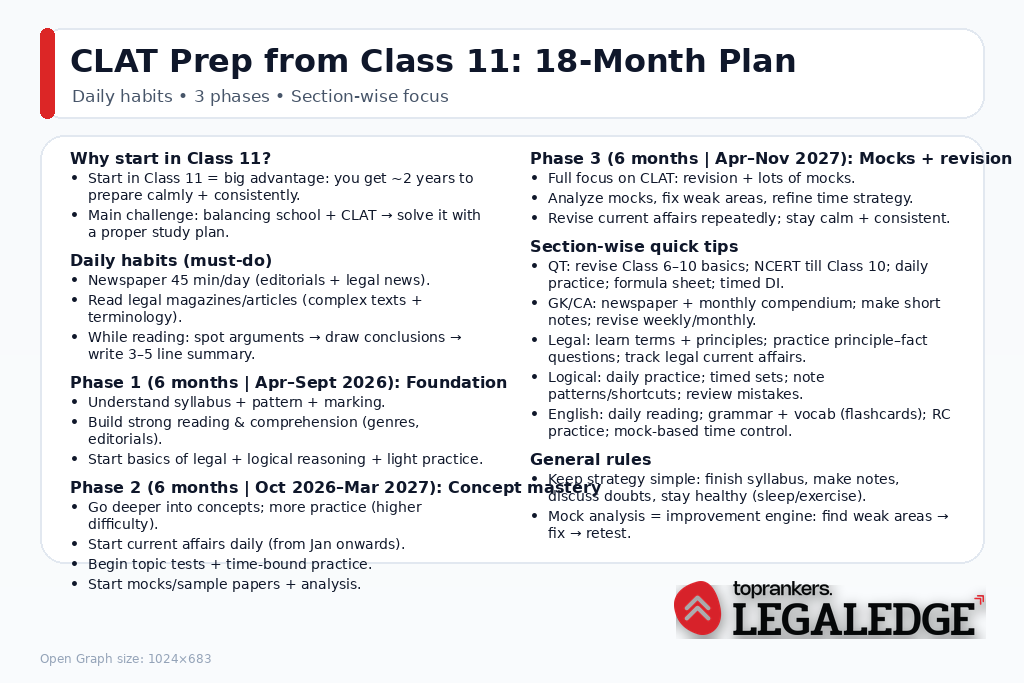How To Prepare For CLAT from Class 11? Study Plan & Preparation Strategy
January 5, 2026
Reader's Digest: Are you aiming for a top law school and wondering when to start your CLAT preparation? The answer is now! Beginning your CLAT journey in class 11 can give you the competitive edge you need to excel.
If you start your preparation in class 11th, you have almost two years to prepare for the CLAT exam, which is more than enough time to crack the exam on the first attempt.
Despite this, the question arises regarding how to prepare for CLAT from Class 11th. When you are already overburdened with schoolwork, well, don't panic.
In this blog post, we have cumulated some simple tips to help you better understand how to prepare for CLAT from Class 11th.
Check: CLAT Notification
How to prepare for CLAT from Class 11th?
The difficulty in allocating your time between CLAT preparation and school studies can sometimes cause you to lose confidence, affecting your overall performance.
So, if you decide to prepare for the Common Law Admission Test from class 11th, creating a proper study plan that helps manage board exams and CLAT preparation together is essential.
If you start preparing early, you will have ample time to develop the core skills required to crack the exam.

Here are some tips that you must follow from class 11th :
- Develop a habit of reading the newspaper for at least 45 minutes daily.
- Make sure to read the editorial section and legal news thoroughly.
- Read legal magazines and articles that contain complex legal texts and terminology.
- While reading the articles, try to identify the arguments and draw conclusions.
Also Read: CLAT Participating Universities
CLAT Timetable for Class 11: The 18-Month Strategy
Since you have roughly 1.5 years (18 months) before CLAT 2028, the strategy should unfold in three phases:
|
Phase |
Duration |
Focus Area |
Goal |
|---|---|---|---|
|
Phase 1 |
6 months (Class 11, April–Sept 2026) |
Foundation building |
Strengthen basics and reading habits |
|
Phase 2 |
6 months (Oct 2026–Mar 2027) |
Concept mastery |
Start sectional tests, GK prep |
|
Phase 3 |
6 months (Apr–Nov 2027) |
Integration & revision |
Full mocks, strategy building |
Learn how to prepare for CLAT from Class 11th in three phases:
So, we have divided your CLAT exam preparation into three phases; check below and start preparing this way:
Phase 1: Class 11th - Build Foundation
-
Familiarize Yourself with CLAT: Start by understanding the CLAT exam pattern, syllabus, and marking scheme. This will give you a clear picture of the exam.
- It is essential to spend the first few weeks familiarising yourself with the CLAT syllabus, checking and browsing previous years that follow a similar pattern, and understanding your required skills.
- Get information about the eligibility and the paper pattern.
-
Build a habit of reading: CLAT is a heavily reading-centric examination. Therefore, it is necessary to develop strong reading and comprehension skills.
- With this, you should focus on genre-specific reading. The CLAT paper asks for passages from various genres, and not everyone's understanding is strong. So, while reading, understand the technicalities of that genre to get a better understanding.
- Read good magazines like Outlook, Frontline, The Week, etc.
- Start reading newspapers every day, preferably The Hindu/Indian Express.
- Along with this, focus a lot on editorials as well, develop a critical approach, understand the article, summarise it, and apply critical thinking.
Learn: How to read a newspaper?
-
Strengthen Fundamentals:
- Choose appropriate CLAT study materials, CLAT books, and resources for your CLAT preparation.
- Consider joining a coaching institute for structured guidance.
- Study Material Selection:
- Begin acquainting yourself with basic legal concepts and logical reasoning and start applying them.
- Start solving simple logical reasoning puzzles and practice legal reasoning questions.
- Legal and Logical Reasoning Basics and Application:
- Focus on your academic performance in class 11 and CLAT subjects like English Language, Legal Reasoning, Logical Reasoning, Current Affairs and General Knowledge, and Quantitative Techniques.
- Develop strong reading and comprehension skills for the English section.
- Work on improving your mathematical aptitude for the Mathematics section.
- Pay a lot of attention to the theories of law.
- Learn tricks and concepts of logical reasoning.
Phase 2: Vacation after 11th and beginning of Class 12th - In-Depth Preparation
-
Continue Building Strong Fundamentals:
- Maintain a strong academic focus in your class 12th subjects while dedicating more time to CLAT-related subjects.
- Now that the basics are straightforward, dive deeper into the concepts and theories and devote 75% of your preparation time to practising questions about different difficulty levels.
- From January onwards, current affairs have become important; therefore, we will start preparing them daily.
- Give topic tests to test each topic's in-depth understanding and clarity thoroughly.
- Start practicing in a time-bound manner.
- Reading newspapers and magazines is still of utmost importance.
-
Practice Mock Tests and Sample Papers:
- Start taking regular CLAT mock tests and solving CLAT sample papers.
- Analyze your performance, identify weak areas, and work on improving them.
- Simulate exam conditions as closely as possible during these practice tests.
- Current Affairs and General Knowledge:
- Stay updated with current affairs through newspapers, magazines, and online sources.
- Prepare concise notes on important national and international events.
- Practice solving current affairs-related questions.
-
Legal Research:
- Begin exploring legal research skills, as it will be helpful in the legal reasoning and essay sections.
- Read legal articles and cases to enhance your understanding of legal topics.
Phase 3: 6 months before CLAT
-
Dedicated CLAT Preparation:
- Dedicate your full attention to CLAT preparation.
- Revise all subjects thoroughly, and practice many questions for each subject.
- Give a lot of focus on current affairs and keep revising them so that you remember them.
- Reading newspapers and magazines is still of utmost importance.
-
Revision and Mock Tests:
- Revise your notes thoroughly at regular intervals.
- Brush up on your concepts and theories.
- Solve more mock tests to improve your time management and test-taking strategies.
- Analyse your mocks, identify your mistakes, and work on them.
- Analyse the previous year's CLAT papers to understand the question trends.
- Stay Calm and Confident:
- Maintain a calm and positive mindset as the exam approaches.
- Keep a balanced routine and get sufficient rest.
Remember that CLAT preparation is a gradual process that requires consistent effort, practice, and continuous improvement. Starting early in class 11 gives you a significant advantage and increases your chances of success in the exam.
Read: Detailed study strategy for CLAT
How to prepare for CLAT from Class 11th? Section-Wise
CLAT Mathematics Preparation Tips
Preparing for the Quantitative Techniques section in CLAT is crucial because it tests your mathematical aptitude. Here are some effective tips to help you prepare for this section:
- Familiarize yourself with the topics in the Quantitative Techniques section. The syllabus typically includes arithmetic, algebra, geometry, and data interpretation.
- Ensure you have a strong foundation in basic mathematical concepts, including arithmetic operations, percentages, ratios, fractions, and basic algebraic equations. Revise topics from classes 6 to 10.
- NCERT mathematics textbooks (up to class 10) are excellent resources for CLAT preparation. These books cover the fundamentals well and are aligned with the syllabus.
- Mathematics requires consistent practice. Dedicate time daily to solving mathematical problems and exercises. Use additional reference books for practice, such as RS Aggarwal's Quantitative Aptitude or Arun Sharma's books on quantitative aptitude.
- Maintain formula sheets for different mathematical concepts, equations, and rules. These sheets can be handy for quick revision.
- CLAT has a time constraint, so focus on improving your speed without compromising accuracy. Practice solving problems under timed conditions to develop your time management skills.
- CLAT may include arithmetic, algebra, mensuration, and data interpretation questions. Practice a wide variety of problems to cover all possible question types.
- Solve previous years' CLAT papers to understand the types of quantitative questions asked and the difficulty level. Regularly take full-length CLAT mock tests that include the quantitative techniques section. This will help you simulate exam conditions and assess your progress. Analyse your performance and identify areas that need improvement.
- Data interpretation questions often appear in CLAT. Practice interpreting graphs, charts, and tables to answer questions accurately.
- If you encounter challenging problems or concepts you need help understanding, feel free to seek help from teachers, peers, or online resources.
- After taking practice tests and mock exams, thoroughly review your mistakes. Understand why you made them and learn from them.
- Dedicate time to revising the concepts you've learned. Revision is crucial for retaining information and improving your performance.
Also Read: Detailed Strategy For QT preparation
CLAT General Knowledge & Current Affairs Preparation Tips
- Preparing for the General Knowledge (GK) and Current Affairs section in CLAT is essential as it assesses your knowledge of current events, general awareness, and contemporary issues. Here are some effective preparation tips for this section:
- Start by reading standard reference books that cover various topics related to Indian and world history, geography, politics, economics, and culture. Some recommended books include the Manorama Yearbook, the India Yearbook, and Lucent's General Knowledge.
- Develop a habit of reading newspapers like "The Hindu" or "The Indian Express". These newspapers provide comprehensive coverage of current affairs.
- Subscribe to monthly magazines like "Pratiyogita Darpan" or "Civil Services Chronicle," which compile important current affairs topics from the previous month.
- Maintain a diary or digital document where you jot down important current events, their significance, and any related facts or statistics. This will help you consolidate your knowledge.
- Set aside time each week or month to review and consolidate your notes on current affairs. Focus on the most relevant and significant topics.
- Engage in discussions about current affairs with peers, teachers, or online forums to gain different viewpoints and insights.
Check Out: How to memorise Current Affairs?
CLAT Legal Reasoning Preparation Tips
- Preparing for the Legal Reasoning section in the CLAT exam requires a good understanding of legal concepts and reasoning skills. Here are some effective tips to help you prepare for this section:
- Familiarize yourself with the legal reasoning questions format in CLAT. They typically present a given situation or set of facts, followed by a legal principle or rule.
- Start by learning the basic legal terminology and concepts. Understanding legal terms and principles is essential for comprehending and answering questions.
- Read fundamental legal texts and documents, such as the Indian Constitution, important statutes, landmark judgments, and legal commentaries. This will help you understand the basis of Indian law.
- Invest in CLAT-specific study materials or books focusing on legal reasoning and knowledge. These resources often provide practice questions and explanations.
- Solve previous years' CLAT legal reasoning questions to understand the question types and difficulty levels. Analyze the solutions to understand the logic behind each answer.
- Use books specifically on legal reasoning, such as Universal's CLAT Guide or Pearson's Legal Awareness and Legal Reasoning.
- Practice solving case studies and legal scenarios. Analyze the given facts and apply legal principles to conclude.
- Deepen your understanding of legal concepts by studying contracts, torts, criminal law, constitutional law, and other relevant areas. Focus on key legal principles and landmark cases related to these subjects.
- Create concise notes summarizing important legal principles, cases, and concepts. These notes will serve as quick references during your revision.
- Keep yourself updated with recent legal developments, significant court judgments, and legislative changes. This demonstrates your awareness of current legal affairs.
- Include legal reasoning mock tests in your practice routine. This will help you become familiar with the exam format and improve your time management.
- After solving practice tests, thoroughly review your mistakes. Understand why you selected incorrect answers and learn from your errors.
- Stay updated with legal current affairs, including recent court decisions and changes in laws, especially those relevant to the CLAT syllabus.
Read: Legal Reasoning Preparation Tips
CLAT Logical Reasoning Preparation Tips
- Preparing for the Logical Reasoning section in CLAT is essential because it evaluates your ability to think critically, analyze situations, and make logical deductions. Here are some practical tips to help you prepare for this section:
- Familiarize yourself with the different types of logical reasoning questions in CLAT. These may include analytical reasoning and critical reasoning.
- Dedicate time daily to practice logical reasoning questions. Consistent practice will help improve your problem-solving skills. Utilize books designed explicitly for logical reasoning practice, such as RS Aggarwal's "Verbal and Non-Verbal Reasoning." "GMAT Official Guide".
- Solve previous years' CLAT logical reasoning questions to understand the question patterns and difficulty levels. Analyze the solutions to understand the reasoning behind each answer.
- Maintain a notebook where you jot down various types of reasoning patterns, techniques, and shortcuts that you come across during your practice.
- During your practice sessions, time yourself while solving logical reasoning questions. Try to improve your speed without sacrificing accuracy.
- Improve your critical reasoning skills by evaluating arguments and identifying logical fallacies.
- After solving practice tests, thoroughly review your mistakes. Understand why you selected incorrect answers and learn from your errors.
- Refrain from limiting yourself to one type of logical reasoning question. Explore various subtypes within logical reasoning to ensure you are prepared for any format.
- Take full-length CLAT mock tests that include logical reasoning sections to simulate exam conditions and improve time management.
Check out: How to Score 25+ in Logical Reasoning?
CLAT English Language Preparation Tips
- Develop a daily reading habit. Read newspapers, magazines, and quality literature to improve your vocabulary, comprehension, and general awareness.
- Brush up on your grammar and vocabulary skills. Use reference books like "Wren and Martin's High School English Grammar & Composition" and "Word Power Made Easy" by Norman Lewis to strengthen your foundation.
- Practice reading comprehension passages regularly. Focus on understanding the main idea, supporting details, and the author's tone.
- Pay attention to how words are used in different contexts. This will help you understand the nuances of language.
- Build your vocabulary by learning synonyms and antonyms. Use flashcards or vocabulary apps for effective memorisation.
- Take CLAT-specific mock tests and solve sample papers to get a feel for the exam and assess your performance.
- Allocate a specific amount of time for the English Language section during practice to improve your time management skills.
- After taking practice tests, analyze your mistakes and understand the reasons behind them. Learn from your errors to avoid repeating them.
- Consistency is key. Make English language practice a daily routine to improve your language skills gradually.
Check out: highly recommended books for CLAT.
General Tips to Crack CLAT with a High Score
Here are a few general tips to Crack CLAT Exam in one attempt. Try to follow these tips for better results.
- Plan your Study Routine: Plan your daily and study routines accordingly. Don't waste time on frivolous things. Yoga and Exercise are recommended for better health and to keep you focused and relaxed.
- Complete the syllabus: Study the entire syllabus, paying more attention to the important topics.
- Prepare notes: Make notes and write down important points from your studies so that you can revisit them quickly the next time.
- Discuss with Friends and Teachers: Discuss the syllabus and notes with friends and teachers. This will help you learn a few new things and expand your understanding of certain topics.
-
Make sure your strategy and process are as simple as possible. Remember that you have regular school classes and 12th Board exams in addition to the preparation.
Conclusion
The key takeaways from above on CLAT preparation starting from class 11 are
- Starting early in class 11 allows for a gradual and structured preparation for the CLAT exam.
- Divide your preparation in three phases, each with specific goals and strategies.
- Phase 1 (Class 11th) focuses on building a foundation, familiarising with CLAT, and developing strong reading and comprehension skills.
- Phase 2 (Vacation after 11th and the beginning of Class 12th) involves in-depth preparation, strengthening fundamentals, practicing mock tests, staying updated with current affairs, and starting legal research skills.
- Phase 3 (6 months before CLAT) is dedicated entirely to CLAT preparation, including revision, extensive practice, mock tests, and staying calm and confident.
- Reading newspapers, magazines, and practising mock tests regularly are essential components of CLAT preparation.
- Analyzing mock test results, identifying weaknesses, and working on them is crucial for improvement.
- Legal reasoning, logical reasoning, and strong fundamentals in subjects like English, mathematics, and legal concepts are emphasised throughout the preparation phases.
- The gradual and consistent approach to CLAT preparation is highlighted, emphasizing the importance of dedication and practice.
Frequently Asked Questions
Can I start Preparing for CLAT from Class 11?

How many hours should I study for CLAT during class 11?

How do I manage CLAT and board exams together?

Whether the CLAT Exam is difficult?

Which newspaper is best for CLAT Preparation?

How much time is sufficient for CLAT Preparation?




SHARE